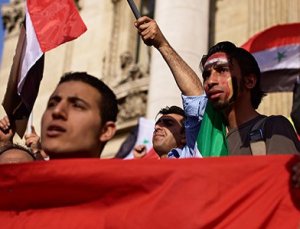
On November 14, Arabic publications funded by Riyadh published the alleged original documents on Hezbollah’s upcoming plans to “attack” the Syrian territory around Qalamoun (the residence of Christians on the border between Syria and Lebanon). This”attack” will supposedly be preceded by provocative terrorist acts in the Shiite areas of Beirut, such as night-time car bombings. After this, Hezbollah’s troops will begin their attack starting from the Bekaa Valley area in Lebanon and advancing to Qalamoun under the slogan of “protecting Shiite holy sites.”The attackis supposedly needed to help Syrian President Bashar al-Assad achieve a favourable balance of forces on the battlefield and to press for resolutions at the Geneva-2 conference that would benefit him.
However, before assessing this version, let’s see who really benefits from this more than two-year conflict in Syria; who carries out the offensive and defensive operations on both the Syrian and the entire Middle Eastern stage of war.It is already clear to everyonethat neither Syria nor Syrians themselves, be it the authorities or the opposition, have gained anything from this conflict. Syria is 70% destroyed, with more than one hundred thousand people killed and millions of refugees living in temporary camps in neighbouring countries. Famine and disease sweep the country, including the recent epidemic of polio, whose victims are mostly children. Nor has anything been gained by Hezbollah.
Besides Israel, the beneficiaries have turned out to be primarily Islamic radicals. If we look at the map of the Middle East pre-“Arab Spring” and now, we can see that, with the exception of the small areas they have controlled for the past few years in Yemen, al-Qaeda and its clones have broken out for the first time in history and made a quantum leap. They began controlling vast strips of territory (parts of Anbar province in Iraq, northern and north-eastern Syria) and creating quasi-state structures in a number ofcountries, especially in western Iraq and eastern Syria. Terrorist organisationsbegan to harness the strategic resources of the region: water (Euphrates River) and oil (Syrian oil fields in the region of Deir al-Zor).
On November 8, Al Jazeera reported that the leader of al-Qaeda had announced a reformattingof its troops in Syria.He dissolved the “Islamic State of Iraq and the Levant”(ISIL), declaring the al-Nusra Front to be the only “legitimate” offshoot of al-Qaedain Syria. This was done in order to stop infighting between factions and concentrate all efforts on the fight againstAssad’s regime. The formerISILhas now been instructed to focus on Iraq, which is why it lost the prefix “Levant”. As reported by the newspaper Al-Hayat on November 16, the Aleppo Ulema Front’s call to the ISI(L) to join the Free Syrian Army is unlikely to be heard, given al-Zawahiri’s order. After all, the ISI(L) still obeys al-Qaeda, and therefore its leaders Abu Bakr al-Baghdadi (who, according to al-Zawahiri, has exceeded his powers by extending his activities into Syria) and al-Zawahiri.
This is where Hezbollah and al-Qaeda’s plans start to intersect.Al-Qaeda is busy with the systematicdestruction of the Syrian state, and not only the regime of Basharal-Assad, as it has officially declared. Its interest is in creating a continuous Sunni area in the country, in order to then establish its own caliphate there. To this end, the still significant Christian population of Syria must be expelled. It seeks to achieve this through violence and terror, the taking of prisoners and killings of priests, and the destruction of temples and monasteries.
In this context, the Islamist militant attack this fall on Christian areas in Qalamoun (where the last three villages that still speak Aramaic – the language of Jesus Christ – are located) had a dual purpose: to expel the Christian population, and to find a strategic replacement for Qusayr (lost in the battle this spring) which gave it control of the strategic Damascus-Homs highway. Control of Qalamoun allows jihadi fighters to receive reinforcements from Sunni areas of Lebanon, primarily Arsal, and cut off the Damascus-Homs-Aleppo route.
However, the partial seizure of Qalamoun by Islamists is now jeopardised by the concentration of Hezbollah forces in Lebanon, which intends to prevent jihadists from replenishing money and weapons from Lebanon during the November 16 attack of Syrian forces on jihadists in Qalamoun. Hence the fierce campaign against Hezbollah in the Saudi-controlled media.
Obviously, squeezing the jihadists out of Qalamoun forces them to flee to Lebanon, where they run right into the swords of Hezbollah, which will lead to their destruction and the total forfeit of their strategic vision of an attack on Damascus. Therefore, Hezbollah’s role militarily is not to attack militant lines, as Saudi media clamours, but to prevent them from spilling over into Lebanon, which fits well with Lebanese national interests.
In the event of the Syrian army’s highly probable victory in Qalamoun, it will become clear that the Syrian opposition’s chances at military victory, if anyone still has any illusions about this, are none.
However, this does not mean that the jihadists and their numerous clones will suffer a complete defeat. An extensive area from Deir al-Zor and Al-Hasakah in northeastern Syria over to Azaz in the north, including some districts of Aleppo, will still remain under their control. And although there they are pressed by Kurdish troops, they still have control over large enough areas of water and oil resources.
The solution to this problem will depend for the most part on how the process ofreconciliation within Syria goes. If Geneva-2 is convened, thejihadists can be isolated politically if their actions are unconditionally condemned by the sane part of the Syrian opposition and if they cease to receive support from the Gulf states and Turkey (which, we have to admit, has changed its tune in recent months). In this way, the jihadist expansion could, perhaps, be stopped.
Maxim Egorov, political commentator on the Middle East, exclusively for the “New Eastern Outlook” online magazine.
